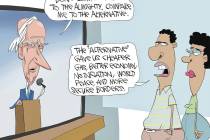Catalyst Fund violates Nevada’s constitution
Did you watch the Super Bowl? Remember in the fourth quarter, when the Seahawks led by a score of 36-8?
Imagine if the officials had stopped the game and taken 15 points from the Seahawks and given them to the Broncos to make the game more competitive.
The outcry would have been immediate and unrelenting. Fans on all sides would have been outraged by “neutral” officials taking what one team had earned and giving it to the competition.
As outrageous as that would have been, it is analogous to what’s happening to business owners in Nevada, such as entrepreneur Michael Little, because of Nevada’s Catalyst Fund.
In 2011, under the guise of “economic development,” state lawmakers created the Catalyst Fund, administered by the Governor’s Office of Economic Development, to provide up to $10 million in state tax dollars to private businesses.
GOED selects businesses to receive handouts to expand their current operations or move to Nevada. One of GOED’s first subsidy awards, $1.2 million over three years, went to SolarCity, an alternative energy company.
So Little, son of former Democratic Assemblywoman Pat Little, is now faced with the prospect of the government taking some of his tax dollars and giving them to a business he’s competing against in the alternative energy marketplace.
That’s unjust, economically foolish and also unconstitutional.
That’s why the Nevada Policy Research Institute’s Center for Justice and Constitutional Litigation has just filed a lawsuit on Little’s behalf, charging that the Catalyst Fund violates Article 8, Sections 9 and 10 of the state constitution. Section 9 states: “The State shall not donate or loan money, or its credit, subscribe to or be, interested in the Stock of any company, association, or corporation, except corporations formed for educational or charitable purposes.”
Politicians and rent-seeking businesses have tried three times in the last 22 years to get voters to amend the Nevada Constitution to allow government gifts, loans or so-called “investments” in private businesses. Each time, however, voters have soundly rejected those attempts — by margins of 19, 30 and 53 percentage points.
Fully aware, then, that Nevada’s constitution prohibits business subsidies by state government, politicians tried to circumvent this constitutional provision by routing Catalyst Fund payments through local-government agencies that the state itself authorized to provide handouts.
So the state provides the money, selects the recipients, then passes the money through a local government agency so that the state isn’t the entity directly providing the subsidy.
But routing the money through an additional layer of bureaucracy doesn’t change the fact that state government is taking money from Michael Little and providing it to his competitor.
And the precedent the state is trying to establish here is chilling. Nevada’s constitutional protections are meaningless if state politicians can avoid them by creating a local government agency for the express purpose of taking constitutionally prohibited actions. Imagine if the U.S. Supreme Court ruled it acceptable for the federal government to hire a private security firm to invade your home to circumvent the search-and-seizure protections embodied in the Fourth Amendment.
State government can’t delegate powers it doesn’t have, and Nevada’s courts need to bring to an end the unconstitutional Catalyst Fund.
Business subsidies are also bad economics. The way to create jobs and economic growth in Nevada is not by “awarding” subsidies to a few politically connected corporations, but by reducing regulatory and taxation burdens on those looking for a more favorable business climate. The failure of companies such as Solyndra, Abound Solar, Fiskar and ThromboVision provide recent examples of hundreds of millions of taxpayer dollars wasted on private business subsidies. But the practice of businesses seeking and wasting tax dollars is a problem that existed before Nevada even became a state.
Thus, when Nevada’s founders wrote the state’s constitution in 1864, a clause forbidding state gifts to corporations had become part of the necessary template for state constitutions.
And although the industries seeking taxpayer handouts have changed in the last 150 years, the need for efforts such as this lawsuit to defend the constitutional protection of nonfavored businesses and taxpayers remains as strong as ever.
Andy Matthews is president of the Nevada Policy Research Institute (npri.org).























